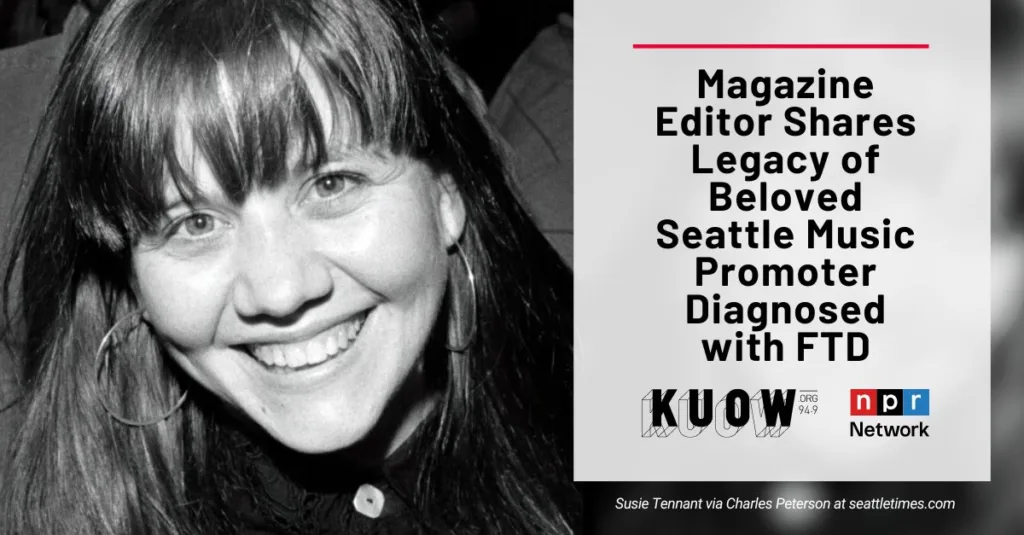Magazine Editor Shares Legacy of Beloved Seattle Music Promoter Diagnosed with FTD

In an interview with NPR, Charles R. Cross, former editor of the music magazine The Rocket, shared the legacy of Seattle music promoter Susie Tennant, who died in January after living with FTD for several years. In addition to bringing several Seattle bands, including Nirvana, into the limelight, Tennant brought sincere positivity to the city’s music scene, Cross said.
“She brought such a positive and upbeat attitude to everything that she did,” Cross told NPR. “She was the most passionate promo person that I’d ever encountered. When she got behind a record, she was really behind it.”
Tennant was beloved throughout the Seattle music scene at a time when making enemies and sacrificing friends was common. Tennant rose above the negativity, Cross said; she was “supporter in every way – she went to people’s shows, she talked up bands, and she danced.”
In an obituary for The Seattle Times, Cross wrote that Tennant was an early, passionate supporter of Nirvana who played a crucial role in helping the band break into the mainstream. In an email, former Nirvana band members Dave Grohl and Krist Novoselic recalled how Tennant organized the release party for the release of the band’s most well-known album, Nevermind, and how she laughed off the fact that the band members were later being kicked out of their own party for starting a food fight.
Tennant’s passion for the bands she promoted would have a significant impact on them, with the band the Supersuckers even writing a song about her. Her positivity and were returned to Tennant after she began to experience health problems. In addition to a benefit concert in 2011 to help pay for Tennant’s medical bills, many Seattle musicians would participate in the event “A Great Day for Susie” at the Museum of Pop Culture.
“There was no one in Seattle music that was as well-loved or as respected as Susie,” said Kim Warnick of the Fastbacks. “She was the bond that connected so many, and there wasn’t a person in Seattle music that didn’t love her.”
As Tennant’s FTD progressed, she would sometimes call Cross him to ask him for details about her own accomplishments. Despite this, she maintained her usual upbeat attitude and a sense of humor, Cross wrote. While undergoing treatment, Tennant kept making new friends living her life to the fullest, Cross wrote.
“If you embrace something you love passionately and you put yourself into it and work both in it professionally and put it forward personally, you can change the world,” Cross told NPW. “Susie’s love of music, and particularly of some Seattle bands, did that. That itself is a remarkable story.”
Sharing the stories of those who have lived with FTD raises awareness and helps challenge the stigma that persons diagnosed often face. Former newspaper editor Lonny Cain shared in a column how he relates to his friend living with PPA by playing basketball with him. Diana and Sandra Gonzalez-Morett discussed in an interview how their experiences with their mother’s FTD inspired their short film Pedacito de Carne.
By Category
Our Newsletters
Stay Informed
Sign up now and stay on top of the latest with our newsletter, event alerts, and more…
